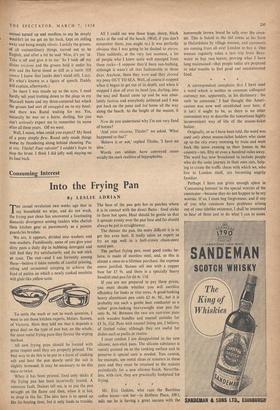Consuming Interest
Into the Frying Pan
By LESLIE ADRIAN THE casual revelation two weeks ago that in my household we wipe, and do not wash, the frying pan clean has uncovered a fascinating domestic divergence among readers who cherish their kitchen gear as passionately as a painter guards his brushes.
We are, it appears, divided into washers and non-washers. Fastidiously, some of you give your dirty pans a daily dip in bubbling detergent and still find they fry satisfactorily and do not stick or taste. The rest—and I am fervently among them—believe it takes months of careful priming, oiling and occasional scraping to achieve the kind of patina on which a newly cooked omelette will glide like yellow satin. • To settle the wash or not to wash question, I went to see those kitchen experts, Messrs. Staines, of Victoria. Here they told me that it depends a great deal on the type of pan but, on the whole, for most metal frying pans they favour the wiping method.
All new frying pans should be treated with great respect until they are properly primed. The best way to do this is to put in a layer of cooking salt and heat the pan slowly until the salt is slightly browned. It may be necessary to do this once or twice.
When it has been primed, food only sticks if the frying pan has been incorrectly heated. A common fault, Staines tell me, is to put the pan straight on the flame and then, when it is hot, to drop in the fat. The idea here is to speed up the fat-heating time, but it only leads to trouble. The base of the pan gets hot in patches where it is in contact with the direct flame : food sticks to these hot spots. Heat should be gentle so that it spreads evenly over the pan base and fat should always be put in straightaway.
The thinner the pan, the more difficult it is to get this even heat. It really takes an expert to fry an egg well in a half-crown chain-store metal pan.
The perfect frying pan, most good cooks be- lieve, is made of stainless steel, and, as this is almost a once-in-a-lifetime purchase, the expense seems justified. Staines sell one with a copper base for £5 9s. and there is a specially heavy Swedish steel pan for £6 4s. 11d.
If you are not prepared to pay these prices, you must decide whether you will sacrifice efficiency for looks or vice versa. A good-looking heavy aluminium pan costs £2 4s. 9d., but it is probably not such a gentle heat conductor as a rather grim-looking heavyweight iron pan for only 8s. 9d. Between the two are cast-iron pans with wooden handles and enamel outsides for £1 3s. 31d. Pans with enamel lining are, I believe, of limited value, although they are useful for dishes such as paella or risotto.
I must confess I am disappointed in the new silicone, non-stick pans. The silicone substance is merely painted on to the cooking surface and to preserve it special care is needed. You cannot, for example, use metal slices or scourers in these pans and they must be returned to the makers periodically for a new silicone finish. Neverthe- less, with care, they are practically foolproof for frying.
Mr. Eric Geddes, who runs the Bambino coffee house—not bar—in Holbein Place, SW1, tells me he is having a great success with the homemade brown bread he sells over the coun- ter. This is baked in the old ovens at his farm in Oxfordshire by village women, and customers are coming from all over London to buy it. One woman regularly takes a taxi trip from Bays- water to buy two loaves, proving what I have long maintained—that people today are prepared to take trouble to find good and unadulterated food.
* A correspondent complains that I have used a word which is neither in common colloquial currency nor, apparently, in his dictionary : the verb 'to commute.' I had thought this Ameri- canism was now well established over here; if it isn't it ought to be, as there is no other convenient way to describe the (sometimes highly inconvenient) way of life of the season-ticket holder.
Originally, or so I have been told, the word was used only about season-ticket holders who came up to the city every morning by train and went back the same evening to their homes in the country—ten, fifty or even a hundred miles away. The word has now broadened to include people who do the same journey in their own cars, help- ing to create the traffic chaos with which we, who live in London itself, are becoming angrily familiar.
Perhaps I have not given enough space in 'Consuming Interest' to the special worries of the commuter—because they do not happen to be my worries. If so, I must beg forgiveness; and if any of you who commute have problems arising out of your tidelike existence, I shall be interested to hear of them and to do what I can to assist.


































 Previous page
Previous page